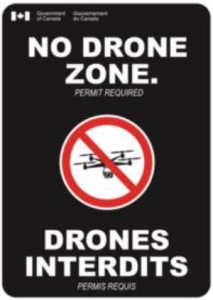
Canadians expect to feel safe on the ground and in the sky, which is why Transport Canada is moving forward with a number of safety initiatives for drones.
Kate Young, Member of Parliament for London West and Parliamentary Secretary to the Minister of Transport, on behalf of Minister Marc Garneau, today outlined concrete steps that have been taken to improve safety and support innovation in one of Canada’s fastest growing industries: drones. This includes launching a new incident-reporting tool to keep Canadians safe from reckless drone use and issuing new exemptions for non-recreational operators that will help industry evolve and develop in a rapidly changing field.
The new online reporting tool will allow people to report drone “incidents” from their mobile phones and will help Transport Canada “gather valuable information that will assist inspectors with investigations.” It serves as a single-entry-point for drone incident reporting but is not intended to replace the existing official aviation incident reporting systems, such as the Civil Aviation Daily Occurrence Reporting System (CADORS).
Along with basic information such as date and location of the incident, the online form asks the following questions:
- Was the drone flying near an aircraft?
- Was the drone flying at a high altitude?
- Was the drone flying close to an airport/aerodrome (helipad, heliport, seaplane base, etc.)? and
- Did the drone fly close to or over the following zones? (such as a populated area; home/private property; crowd (sporting event, concert, festival); forest fire; moving vehicles, highways, busy streets, bridges, etc.)
Complaints are also asked to provide a description of the drone (helpful drone silhouettes are provided) and a description of the operator. The form also asks the complainant whether they have “gathered evidence” such as photos or video. Complainants have the option of reporting anonymously.
Over the past year, Transport Canada has made progress on drones, also known as unmanned air vehicles (UAVs). The department is focused on a number of key areas including:
- Helping Canadians report safety concerns through a new online tool
- Improving regulations for drone operators
- Simplifying rules for commercial operators with two new exemptions
- Supporting innovation for commercial operators at a new drone test site in Alberta
- Partnering with retailers to provide safety information at the point-of-sale
- Launching a No Drone Zone public awareness campaign
Canadians are encouraged to visit www.canada.ca/drone-safety for updates on the department’s progress on drones.
Quotes:
“Transport Canada is proud of the work that’s been done over the past year to improve safety for Canadians and support innovation for the drone industry. Many Canadians will receive or purchase drones over the holidays this year and we encourage all new operators to learn the rules and help us keep the skies safe.”
Kate Young
Member of Parliament for London West
“In the past few years, the use of drones in Canada has increased tremendously and it’s a good time to be working with this industry. Transport Canada is taking a number of steps to improve safety and innovation in this sector, including engaging retailers so new drone users are aware of the rules from the start; introducing an efficient tool for Canadians to report safety issues; and helping drone users test new technology.”
The Honourable Marc Garneau
Minister of Transport
“The growth and availability of drones and other unmanned aircraft have truly opened the skies. Whether you’re flying for fun or work, it’s important to always put safety first. Fanshawe is doing its part to keep the skies safe by offering Transport Canada-compliant training, developed to ensure drone pilots have the knowledge and skills to contribute to an industry culture marked by growing diligence and responsibility.”
Stephen Patterson
Chair of Fanshawe’s Norton Wolf School of Aviation Technology
Quick Facts
- Anyone who operates a drone in a reckless and negligent manner, violates controlled or restricted airspace, or endangers the safety of manned aircraft could face fines of up to $25,000 and/or prison.
- So far in 2016, the department has issued 4,298 SFOCs, compared to 2,480 SFOCs in 2015 (an increase of 73 %)
- If an operator does not follow the requirements of their SFOC, Transport Canada can issue fines of up to $3,000 for an individual and $15,000 for a business.
Source: Press Release
